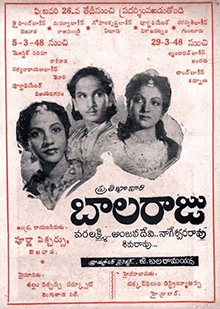Plot
The film begins at Devaloka, where two turtle doves, Yaksha & Mohini, blossom their love. Being conscious of it Indra angers them since he lusts on Mohini. So, he assigns his emissary Kubera, who curses Yaksha to be born as a human with no idea of love. Plus, he drags Mohini to Indra's court, where she accuses him. Accordingly, she is too unfortunate to emerge on earth and pine for her lover. Currently, Yaksha gets to be Balaraju. Mohini is unearthed on a field by a peasant, Kammanaidu, who rears as Sita, and her arrival molds him wealthy. Now it is time for her martial, but Kammanaidu fears that he could lose the totality with her. So, he cages her in one pillar on the outskirts.
Once, Balaraju trespasses from there. Listening to his flute, Sita was enthralled when love blossomed in her and rushed towards him. Balaraju is tense and gets away as ignorant of love. He makes rounds all over the forest, but Sita shadows him as "White on Rice." At one point, tired & hungry Balaraju has a meal from a Shetty and absconds by mortgaging Sita instead of it. Anyhow, Sita skips from him and chases Balaraju again, who frequently attempts to quit her but in vain. Slowly, a transformation occurs in Balaraju and starts endearing Sita. One night, while they are sleeping, bandits abduct Sita. The following day, agitated Balaraju moves on her quest, pleading her whereabouts from a sage, and he is cursed to be a snake due to his revolt for lack of response.
Meanwhile, Sita tactically flees from the burglars and is conscious of Balaraju's pathetic state. Thus, she pledges to recoup him, which she triumphs with a pilgrimage. On the way back, they halt, and Balaraju walks to the grocery, where he encounters Shetty, who charges him as a thief. Tragically, Balaraju dies in that clash. Plus, Shetty ruses by giving a call to Sita on behalf of Balaraju and tries to molest her, but she escapes. En route, she collapses, spotting Balaraju's corpse when Shetty incriminates the two. Ergo, Sita takes a test of fire to prove her innocence. Then, Ashvins appears and boons her with a garland, stating that upon its touch with best wishes, the dead soul awakes and, if discarded alive, is destined to die, and she retrieves Balaraju.
Indra envies it and lifts Sita in the guise of a tribe but vanishes out of her swear word. Now, he fakes being Sita and approaches Balaraju by the time the original lands, which throws Balaraju into dichotomy. Here, a peril, Sita disposes of the garland since quite upset, which falls on Balaraju, and he again passes away. All at once, Sita is infuriated and imprecates Indra when all the deities arrive. Siva brings Balaraju to life, and Indra is also relieved. At last, Indra seeks them to recur to heaven, which they deny as the two flies yearn to fly in this earth of the fruit of love. Finally, the movie ends happily with the couple's union.
